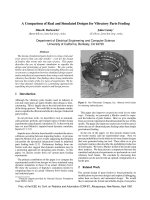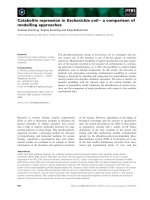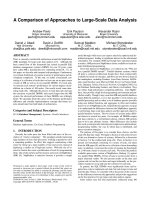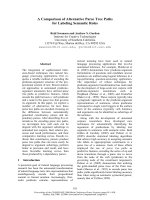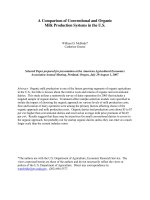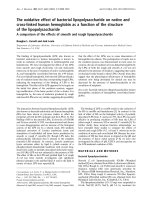AN0520 a comparison of 8 bit microcontrollers
Bạn đang xem bản rút gọn của tài liệu. Xem và tải ngay bản đầy đủ của tài liệu tại đây (111.47 KB, 11 trang )
AN520
A Comparison of 8-Bit Microcontrollers
Author:
8-bit immediate value in one cycle. First, because there
is no conflict between instruction fetch and data fetch
(as opposed to von Neumann architecture) and secondly because the instruction word is wide enough to
hold the 8-bit data.
Mark Palmer
Microchip Technology Inc.
INTRODUCTION
The PIC16C5X/XX microcontrollers from Microchip
Technology Inc., provide significant execution speed
and code-compaction improvement over any other 8-bit
microcontroller in its price range.
The superior performance of the PIC16C5X/XX
microcontrollers can be attributed primarily to its RISC
architecture. The PIC16C5X/XX devices employ a
Harvard architecture (i.e., has separate program memory space and data memory space [8-bit wide data]). It
also uses a two stage pipelining instruction fetch and
execution. All instructions are executed in a single cycle
(200 ns @ 20 MHz clock) except for program branches
which take two cycles, and there are only 33 instructions to remember.
Separation of program and data space allows the
instruction word to be optimized to any size (12-bit wide
for PIC16C5X devices and 14-bit wide for PIC16CXX
devices). This makes it possible, for example, to load an
PIC16C5X/XX
SWAPF
IORWF
Byte/Words
REGHI,W
1
REGLO
1
2
Cycles
1
1
2
0.4 µs
ST62
LD
RLC
RLC
RLC
RLC
ADD
LD
A,REGHI
A
A
A
A
A,REGLO
REGLO,A
Byte/Words
2
1
1
1
1
2
2
10
Cycles
4
4
4
4
4
4
4
28
In the following sections we will compare the
PIC16C5X/XX devices @ 20 MHz with:
•
•
•
•
•
SGS-Thomson ST62 @ 8 MHz
Motorola MC68HC05 @ 4.2 MHz
Intel 8051 @ 20 MHz
Zilog Z86CXX @ 12 MHz
National COP800 @ 20 MHz
Several coding examples will be considered. While the
comparisons are not entirely scientific, they will
demonstrate to the reader the relative superior
performance of the PIC16C5X/XX devices. The
examples chosen are used frequently in microcontroller
applications.
PACKING BINARY CODED DECIMAL
(BCD)
This example will take two bytes in RAM or registers,
each containing a BCD digit in the lower nibble and
create a packed BCD data byte, which is stored back in
the register or RAM location holding the low BCD digit.
COP800
X
SWAP
OR
X
A,[B+]
A
A,[B]
A,[B]
SWAP
OR
REGHI
REGHI,REGLO
Byte/Words
2
2
4
REGHI and REGLO are addressable via
the working register addressing mode.
1997 Microchip Technology Inc.
Cycles
2
1
1
1
5
5 µs
B is pointing to the higher BCD digit initially.
After auto-increment, it points to the lower BCD digit.
MC68HC05
LDA
ROLA
ROLA
ROLA
ROLA
ADD
STA
REGHI
REGLO
REGLO
45.5 µs
REGHI and REGLO are registers
addressable by short direct addressing mode.
Z86CXX
Byte/Words
1
1
1
1
4
Byte/Words
2
1
1
1
1
2
2
10
Cycles
3
3
3
3
3
3
4
22
10.5 µs
Cycles
8
6
14
5.33 µs
8051
MOV
SWAP
ORL
MOV
Byte/Words
Cycles
1
1
1
1
1
1
1
1
4
4
Register Rx contains higher BCD digit,
2.4 µs
Ry holds lower BCD digit.
A,Rx
A
A,Ry
Ry,A
DS00520D-page 1
AN520
LOOP CONTROL
This example is one of simple loop control where a register containing a loop count is decremented, tested for
zero, and if not zero, then branched back to the beginning of the loop.
PIC16C5X/XX
DECFSZ COUNT
GOTO
BEG_LOOP
Byte/Words
1
1
2
Cycles
1/2
2/3/2
0.6 µs/0.4 µs
ST62
DEC
JRZ
X
BEG_LOOP
Byte/Words
1
1
2
Cycles
4
2
6
COP800
DRSZ
JP
Byte/Words
1
1
2
COUNT
BEG_LOOP
6 µs
COUNT is Register (RAM F0h-FFh).
MC68HC05
DECX
BEQ
Byte/Words
1
2
3
BEG_LOOP
DJNZ
Byte/Words
COUNT, BEG_LOOP
2
Cycles
10/12
Cycles
3
3
6
2.86 µs
9.75 µs
Z86CXX
Cycles
3
3
6
8051
DJNZ
Rx, BEG_LOOP
Byte/Words
2
1.67 µs/2.0 µs
Cycles
2
1.2 µs
BIT TEST & BRANCH
This example tests a single bit in a register or a RAM
location and makes a conditional branch. We assume
that the MSb is tested and a branch is to be taken if the
bit is set.
PIC16C5X/XX
BTFSC
GOTO
REG, 7
NEWADD
Byte/Words
1
1
2
Cycles
1/2
2/3/2
0.6 µs/0.4 µs
ST62
JRR
7, NEWADD
Byte/Words
3
Cycles
5
COP800
IFBIT
JP
Byte/Words
1
1
2
7, [B]
NEWADD
B points to the memory location under test.
MC68HC05
BRCLR
7, NEWADD
Byte/Words
3
BTJRT NEWADD, REG, 7
Byte/Words
3
Cycles
16/18
2.67 µs/3.0 µs
DS00520D-page 2
4 µs
Cycles
5
2.38 µs
8.125 µs
Z86CXX
Cycles
1
3
4
8051
MOV
JB
A, @Rx
A.7, NEWADD
Byte/Words
1
3
4
Register Rx is assumed to be pointing to
the memory location under test.
Cycles
1
2
3
1.8 µs
1997 Microchip Technology Inc.
AN520
SHIFTING OUT 8-BIT DATA & CLOCK
We will now consider the task of serially shifting out an
8-bit data and clock. Data and clock outputs are
generated under program control by toggling two output
pins.
Data is transmitted on the rising edge of the clock. No
attempt is made to make the clock output symmetrical
in order to make the code efficient. Data out is guaranteed on the falling edge of the clock. These conditions
are satisfactory for most applications.
PIC16C5X/XX
XMIT
MOVLW
MOVWF
08H
BITCNT
; Bit Count
;
XM1
BCF
BCF
RRF
BTFSC
BSF
BSF
DECFSZ
PORTB, 0
PORTB, 1
XDATA
STATUS, CARRY
PORTB, 0
PORTB, 1
BITCNT
GOTO
BCF
XM1
PORTC, 1
; 0 → Data Out Pin
; 0 → Clock Out Pin
; Rotate Right thru Carry
; Test Carry Bit
; 1 → Data Out Pin
; 1 → Clock Out Pin
; Decrement Count
; Skip if Zero
;
; 0 → Clock
Byte
/Words
1
1
Cycles
Xmit 00h
1
1
Cycles
Xmit FFh
1
1
1
1
1
1
1
1
1
1
1
1
2
—
1
1
1
1
1
1
1
1
1
1
1
11
2
1
74
2
1
74
Byte
/Words
2
2
2
Cycles
Xmit 00h
3
3
3
Cycles
Xmit FFh
3
3
3
1
1
1
1
1
1
1
2
1
16
1
1
1
1
—
1
3
3
3
100
1
1
1
1
1
1
3
3
3
108
Loop
Transmit time is the same for 00h or FFh: 74 Tcyc = 14.8 µs. Note that there was
no need to load the data into the Accumulator (W) since the PIC16C5X/XX can operate directly on file registers.
COP800
XMIT
LD
LD
LD
A, XDATA
BITCNT #08H
B, #D0H
; Load Data in Acc.
; Load Bit Count
; B Points to PORTL
XM1
RBIT
RBIT
RRCA
IFC
SBIT
SBIT
DRSZ
JP
RBIT
0,[B]
1,[B]
; 0 → Clock
; 0 → Data
; Rotate A Right thru Carry
;
; 1 → Data
; 0 → Clock
; Decrement Bit Count
; and Go Back if ≠ 0
;
1,[B]
0,[B]
BITCNT
XM1
0,[B]
Loop
Accumulator (A) is first loaded with the data word. Transmit time is maximum for data = FFh; 105 Tcyc = 105 µs.
ST62
XM1
XM2
LDI
LD
LD
RES
RES
SLA
JRNC
SET
SET
DEC
JRNZ
RES
A, #08
X, A
A, W
0, DRB
1, DRB
A
XM2
1, DRB
0, DRB
X
XM1
0, DRB
; Bit Count
; Xmit Data
; 0 → Clock
; 0 → Data
;
;
; 1 → Data
; 1 → CLK
;
;
;
;
; 0 → Data
Byte
/Words
2
1
1
2
2
2
1
2
2
1
1
2
19
Cycles
Xmit 00h
4
4
4
4
4
4
2
—
4
4
2
4
208
Cycles
Xmit FFh
4
4
4
4
4
4
2
Loop
4
4
4
2
4
240
Register W contains the Data Word.
Transmit time for FFh = 240 cycles = 390 µs.
1997 Microchip Technology Inc.
DS00520D-page 3
AN520
SHIFTING OUT 8-BIT DATA & CLOCK (Cont.’d)
MC68HC05
XMIT
LDA
LDX
XDATA
#$08
; Load Xmit Data
; Load Bit Count
XM1
BCLR
BCLR
ROLA
BCC
BSET
BSET
DECX
BNE
BCLR
0, PORTB
1, PORTB
; 0 → Clock
; 0 → Data
;
;
; 1 → Data
; 1 → Clock
;
;
; 0 → Data
XM2
XM2
1, PORTB
0, PORTB
XM1
0, PORTB
Byte
/Words
2
2
Cycles
Xmit 00h
3
2
Cycles
Xmit FFh
3
2
2
2
1
2
2
2
1
2
2
20
5
5
3
3
—
5
3
3
5
226
5
5
3
3
5
5
3
3
5
266
Byte
/Words
3
3
Cycles
Xmit 00h
10
6
Cycles
Xmit FFh
10
6
Loop
Transmit time is maximum for transmitting FFh = 266 cycles = 126.7 µs.
Z86CXX
XMIT
LD
AND
COUNT, #8
P2, #%FC
; Load Bit Count
; 0 → Data, Clock
XM1
RRC
JR
OR
XDATA
NC, XM2
P2, #01
;
;
; 1 → Data
2
2
3
6
12
—
6
10
10
XM2
OR
DJNZ
AND
P2, #02
COUNT, XM1
P2, #%FC
; 1 → Clock
;
; 0 → Clock, Data
3
2
3
21
10
12
10
348
10
12
10
412
Byte
/Words
1
2
Cycles
Xmit 00h
1
1
Cycles
Xmit FFh
1
1
Loop
Transmit time is maximum for transmitting FFh = 412 cycles = 68.67 µs.
8051
MXIT
MOV
MOV
A, @R0
R1, #08H
; R0 Points to Data Word
; Load Bit Count
XM1
ANL
RRC
JNC
SETB
PORT1, #0FCH
A
XM2
PORT1, 0
; 0 → Data, Clock
; Rotate Right A thru Carry
;
; 1 → Data
3
1
2
2
2
1
2
—
2
1
2
1
SETB
DJNZ
PORT1, 1
R1, XM1
; 1 → Clock
; Decrement Count
2
2
15
1
2
66
1
2
74
XM2
Loop
Transmit time is maximum for transmitting FFh = 74 cycles = 44.4 µs.
DS00520D-page 4
1997 Microchip Technology Inc.
AN520
SOFTWARE TIMER
Microcontrollers quite often need to implement time
delays. Debouncing key input, pulse width modulation,
and phase angle control are just a few examples. Implementing a 10 ms time delay loop subroutine will be considered in this section.
PIC16C5X/XX
DELAY
MOVLW
MOVWF
CLRF
41H
COUNT2
COUNT1
; 10 ms Delay Loop
;
;
LOOP
INCFSZ
GOTO
DECFSZ
GOTO
RET
COUNT1
LOOP
COUNT2
LOOP
; This inner Loop will be
; Executed 256 Times
;
;
;
Byte/Words
1
1
1
Cycles
1
1
1
1
1
1
1
1
8
2/1
2
2/1
2
2
Execution time for the routine = 5 + (255 x 3 + 5) x 65 = 20025 Tcyc = 10.011 ms. The PIC16C5X/XX
can implement delay times very precisely (when necessary) because of its fine instruction cycle resolution.
COP800
DELAY
LD
LD
COUNT1, #0BH
B, #0EH
; 10 ms Delay Loop
;
LOOP
DRSZ
JP
DRSZ
JP
RET
B
LOOP
COUNT1
LOOP
;
;
;
;
;
Byte/Words
2
1
Cycles
3
1
1
1
1
1
1
8
1
1
1
1
5
Byte/Words
2
1
2
1
1
1
1
1
10
Cycles
4
4
4
4
4
2
4
2
Execution time for the routine = (6N2 + 6) N1 + 9 cycles. Here N1 = 0Bh and N2 = 0Eh,
which gives us: 999 Tcyc = 9.99 ms.
ST62
LOOP
LDI
LD
LDI
LD
DEC
JRNZ
DEC
JRNZ
A, #FF
X, A
A, #04
Y, A
X
LOOP
Y
LOOP
; LOOP1 Count
; LOOP2 Count
; 0 CLK
;
; 0 CLK
Execution time for the subroutine = (6N1 + 6) N2 + 16 cycles,
where N1 = FFh, N2 = 04h gives us 10.01 ms.
1997 Microchip Technology Inc.
DS00520D-page 5
AN520
SOFTWARE TIMER (Cont.’d)
MC68HC05
DELAY
LDX
LDX
LOOP
DECA
BNE
DECX
BNE
RTS
$2D
$5C
; 10 ms Delay Loop
;
LOOP
;
;
;
;
;
LOOP
Byte/Words
2
2
Cycles
2
2
1
2
1
2
1
11
3
2
3
2
6
Byte/Words
2
2
Cycles
6
6
2
2
1
9
10/12
10/12
14
Byte/Words
2
Cycles
1
Execution time for the subroutine = (5 x N1 + 5)N2 + 10, with N1 = 2Dh, N2 = 5Ch,
time delay = 10.081 ms.
Z86CXX
DELAY
LD
LD
COUNT1, #%61
COUNT2, #%33
; 10 ms Delay Loop
;
LOOP
DJNZ
DJNZ
RET
COUNT1, LOOP
COUNT2, LOOP
;
;
;
Total execution time = (12N1 +10)N2, with N1 = 61h, N2 = 33h, time delay = 59976 cycles = 9.979 ms.
8051
DELAY
MOV
COUNT1, #21H
; 10 ms Delay Loop
LOOP1
MOV
COUNT2, #FBH
;
2
1
LOOP2
DJNZ
DJNZ
RET
COUNT2, LOOP2
COUNT1, LOOP1
;
;
;
3
3
1
11
2
2
2
Execution time for the subroutine = (2N1 + 3)N2 + 3 cycles. Where N1 = FBh, N2 = 21h,
which gives us: 16668 cycles = 10.0008 ms.
DS00520D-page 6
1997 Microchip Technology Inc.
AN520
SUMMARY
Table 2 summarizes relative execution speed. The
overall speed is an average of relative speed numbers.
For example, the COP800 will, on average, exhibit 27%
of the code execution speed of a PIC16C5X/XX
devices. In other words, a PIC16C5X/XX will be
(1/0.27) 3.7 times faster than a COP800 on average.
Table 1 summarizes code sizes for different
microcontrollers. The overall relative code size number
is an average of the individual relative code sizes.
Given that the program word size of the PIC16C5X/XX
is 12- or 14-bit (compared to an 8-bit program memory
of all the other microcontrollers), a compaction of 1.5 is
expected. Clearly, the PIC16C5X/XX meets this
compaction (except for the COP800) and exceeds the
compaction ratio in most comparisons.
TABLE 1:
COMPARISON OF CODE EFFICIENCY*
Device
COP800
ST62
MC68HC05
Z86CXX
8051
PIC16C5X/XX
*
Packing BCD
Loop Control
Bit Test &
Branch
8-Bit Sync
Transmission
10 ms
Software
Timer
4
2.00
2
1.00
2
1.00
16
1.46
8
1.00
1.29
10
5.00
2
1.00
3
1.50
19
1.73
10
1.25
2.10
10
5.00
3
1.50
3
1.50
20
1.82
11
1.38
2.24
4
2.00
2
1.00
3
1.50
21
1.91
9
1.125
1.51
4
2.00
2
1.00
4
2.00
15
1.36
11
1.375
1.547
2
2
2
11
8
1.00
Overall
In each box, the top number is the number of program memory locations required to code the application. The bottom number is relative code size compared to the PIC16C5X/XX:
# program memory locations for other microcontroller
# program memory locations for the PIC16C5X/XX
1997 Microchip Technology Inc.
DS00520D-page 7
AN520
FIGURE 1:
CODE SIZE COMPARISON
2.24
2.25
2.10
Relative Code Size
2.00
1.75
1.51
1.55
1.50
1.29
1.25
1.00
1.00
51
80
6C
Z8
H
68
M
C
XX
05
C
82
ST
P8
O
C
PI
C
16
C
5X
/X
00
X
Most
Compact
Code
DS00520D-page 8
1997 Microchip Technology Inc.
AN520
TABLE 2:
COMPARISON OF EXECUTION SPEED
10 ms
Software
Timer
Overall
105 µs
0.1408
—
0.108
8.125 µs
0.0738
390 µs
0.0329
—
0.0455
2.86 µs
0.1748
2.38 µs
0.21
126.7 µs
0.1168
—
0.136
2.33 µs
0.172
1.835 µs
0.272
2.835µs
0.176
68.67 µs
0.224
—
0.212
8051
@ 20 MHz
2.4 µs
0.1666
1.2 µs
0.4166
1.8 µs
0.277
44.4 µs
0.33
—
0.30
PIC16C5X/XX
@ 20 MHz
0.4 µs
0.6/0.4 µs
0.6/0.4 µs
14.8 µs
—
1.00
Packing BCD
Loop Control
Bit Test &
Branch
8-Bit Sync
Transmission
COP800
@ 20 MHz
5 µs
0.08
6 µs
0.0832
4 µs
0.1252
ST62
@ 8 MHz
45.5 µs
0.0088
9.75 µs
0.0615
MC68HC05
@ 4.2 MHz
10.05 µs
0.038
Z86CXX
@ 12 MHz
Device
*
In each box, the top number is the time required to execute the example code, while the bottom number is a measure
of relative performance compared to the PIC16C5X/XX.
time required to execute code by the PIC16C5X/XX
time required to execute code by other microcontroller
FIGURE 2:
EXECUTION SPEED COMPARISON
1.00
1.0
Fastest
0.8
0.7
0.6
0.5
0.4
0.30
0.3
0.212
0.2
1997 Microchip Technology Inc.
0.136
0.108
z
H
8
@ 051
20
M
M
@ C6
4. 8H
2 C
M 0
H 5
z
S
@ T8
8 2
M
H
z
0.0455
C
@ OP
20 80
M 0
H
z
P
@ IC1
20 6C
M 5X
H /X
z X
0.1
Z
@ 86
12 CX
M X
H
z
Relative Execution Speed
0.9
DS00520D-page 9
Note the following details of the code protection feature on PICmicro® MCUs.
•
•
•
•
•
•
The PICmicro family meets the specifications contained in the Microchip Data Sheet.
Microchip believes that its family of PICmicro microcontrollers is one of the most secure products of its kind on the market today,
when used in the intended manner and under normal conditions.
There are dishonest and possibly illegal methods used to breach the code protection feature. All of these methods, to our knowledge, require using the PICmicro microcontroller in a manner outside the operating specifications contained in the data sheet.
The person doing so may be engaged in theft of intellectual property.
Microchip is willing to work with the customer who is concerned about the integrity of their code.
Neither Microchip nor any other semiconductor manufacturer can guarantee the security of their code. Code protection does not
mean that we are guaranteeing the product as “unbreakable”.
Code protection is constantly evolving. We at Microchip are committed to continuously improving the code protection features of
our product.
If you have any further questions about this matter, please contact the local sales office nearest to you.
Information contained in this publication regarding device
applications and the like is intended through suggestion only
and may be superseded by updates. It is your responsibility to
ensure that your application meets with your specifications.
No representation or warranty is given and no liability is
assumed by Microchip Technology Incorporated with respect
to the accuracy or use of such information, or infringement of
patents or other intellectual property rights arising from such
use or otherwise. Use of Microchip’s products as critical components in life support systems is not authorized except with
express written approval by Microchip. No licenses are conveyed, implicitly or otherwise, under any intellectual property
rights.
Trademarks
The Microchip name and logo, the Microchip logo, FilterLab,
KEELOQ, microID, MPLAB, PIC, PICmicro, PICMASTER,
PICSTART, PRO MATE, SEEVAL and The Embedded Control
Solutions Company are registered trademarks of Microchip Technology Incorporated in the U.S.A. and other countries.
dsPIC, ECONOMONITOR, FanSense, FlexROM, fuzzyLAB,
In-Circuit Serial Programming, ICSP, ICEPIC, microPort,
Migratable Memory, MPASM, MPLIB, MPLINK, MPSIM,
MXDEV, PICC, PICDEM, PICDEM.net, rfPIC, Select Mode
and Total Endurance are trademarks of Microchip Technology
Incorporated in the U.S.A.
Serialized Quick Turn Programming (SQTP) is a service mark
of Microchip Technology Incorporated in the U.S.A.
All other trademarks mentioned herein are property of their
respective companies.
© 2002, Microchip Technology Incorporated, Printed in the
U.S.A., All Rights Reserved.
Printed on recycled paper.
Microchip received QS-9000 quality system
certification for its worldwide headquarters,
design and wafer fabrication facilities in
Chandler and Tempe, Arizona in July 1999. The
Company’s quality system processes and
procedures are QS-9000 compliant for its
PICmicro® 8-bit MCUs, KEELOQ® code hopping
devices, Serial EEPROMs and microperipheral
products. In addition, Microchip’s quality
system for the design and manufacture of
development systems is ISO 9001 certified.
2002 Microchip Technology Inc.
M
WORLDWIDE SALES AND SERVICE
AMERICAS
ASIA/PACIFIC
Japan
Corporate Office
Australia
2355 West Chandler Blvd.
Chandler, AZ 85224-6199
Tel: 480-792-7200 Fax: 480-792-7277
Technical Support: 480-792-7627
Web Address:
Microchip Technology Australia Pty Ltd
Suite 22, 41 Rawson Street
Epping 2121, NSW
Australia
Tel: 61-2-9868-6733 Fax: 61-2-9868-6755
Microchip Technology Japan K.K.
Benex S-1 6F
3-18-20, Shinyokohama
Kohoku-Ku, Yokohama-shi
Kanagawa, 222-0033, Japan
Tel: 81-45-471- 6166 Fax: 81-45-471-6122
Rocky Mountain
China - Beijing
2355 West Chandler Blvd.
Chandler, AZ 85224-6199
Tel: 480-792-7966 Fax: 480-792-7456
Microchip Technology Consulting (Shanghai)
Co., Ltd., Beijing Liaison Office
Unit 915
Bei Hai Wan Tai Bldg.
No. 6 Chaoyangmen Beidajie
Beijing, 100027, No. China
Tel: 86-10-85282100 Fax: 86-10-85282104
Atlanta
500 Sugar Mill Road, Suite 200B
Atlanta, GA 30350
Tel: 770-640-0034 Fax: 770-640-0307
Boston
2 Lan Drive, Suite 120
Westford, MA 01886
Tel: 978-692-3848 Fax: 978-692-3821
Chicago
333 Pierce Road, Suite 180
Itasca, IL 60143
Tel: 630-285-0071 Fax: 630-285-0075
Dallas
4570 Westgrove Drive, Suite 160
Addison, TX 75001
Tel: 972-818-7423 Fax: 972-818-2924
Detroit
Tri-Atria Office Building
32255 Northwestern Highway, Suite 190
Farmington Hills, MI 48334
Tel: 248-538-2250 Fax: 248-538-2260
Kokomo
2767 S. Albright Road
Kokomo, Indiana 46902
Tel: 765-864-8360 Fax: 765-864-8387
Los Angeles
18201 Von Karman, Suite 1090
Irvine, CA 92612
Tel: 949-263-1888 Fax: 949-263-1338
China - Chengdu
Microchip Technology Consulting (Shanghai)
Co., Ltd., Chengdu Liaison Office
Rm. 2401, 24th Floor,
Ming Xing Financial Tower
No. 88 TIDU Street
Chengdu 610016, China
Tel: 86-28-6766200 Fax: 86-28-6766599
China - Fuzhou
Microchip Technology Consulting (Shanghai)
Co., Ltd., Fuzhou Liaison Office
Unit 28F, World Trade Plaza
No. 71 Wusi Road
Fuzhou 350001, China
Tel: 86-591-7503506 Fax: 86-591-7503521
China - Shanghai
Microchip Technology Consulting (Shanghai)
Co., Ltd.
Room 701, Bldg. B
Far East International Plaza
No. 317 Xian Xia Road
Shanghai, 200051
Tel: 86-21-6275-5700 Fax: 86-21-6275-5060
China - Shenzhen
150 Motor Parkway, Suite 202
Hauppauge, NY 11788
Tel: 631-273-5305 Fax: 631-273-5335
Microchip Technology Consulting (Shanghai)
Co., Ltd., Shenzhen Liaison Office
Rm. 1315, 13/F, Shenzhen Kerry Centre,
Renminnan Lu
Shenzhen 518001, China
Tel: 86-755-2350361 Fax: 86-755-2366086
San Jose
Hong Kong
Microchip Technology Inc.
2107 North First Street, Suite 590
San Jose, CA 95131
Tel: 408-436-7950 Fax: 408-436-7955
Microchip Technology Hongkong Ltd.
Unit 901-6, Tower 2, Metroplaza
223 Hing Fong Road
Kwai Fong, N.T., Hong Kong
Tel: 852-2401-1200 Fax: 852-2401-3431
New York
Toronto
6285 Northam Drive, Suite 108
Mississauga, Ontario L4V 1X5, Canada
Tel: 905-673-0699 Fax: 905-673-6509
India
Microchip Technology Inc.
India Liaison Office
Divyasree Chambers
1 Floor, Wing A (A3/A4)
No. 11, O’Shaugnessey Road
Bangalore, 560 025, India
Tel: 91-80-2290061 Fax: 91-80-2290062
Korea
Microchip Technology Korea
168-1, Youngbo Bldg. 3 Floor
Samsung-Dong, Kangnam-Ku
Seoul, Korea 135-882
Tel: 82-2-554-7200 Fax: 82-2-558-5934
Singapore
Microchip Technology Singapore Pte Ltd.
200 Middle Road
#07-02 Prime Centre
Singapore, 188980
Tel: 65-6334-8870 Fax: 65-6334-8850
Taiwan
Microchip Technology Taiwan
11F-3, No. 207
Tung Hua North Road
Taipei, 105, Taiwan
Tel: 886-2-2717-7175 Fax: 886-2-2545-0139
EUROPE
Denmark
Microchip Technology Nordic ApS
Regus Business Centre
Lautrup hoj 1-3
Ballerup DK-2750 Denmark
Tel: 45 4420 9895 Fax: 45 4420 9910
France
Microchip Technology SARL
Parc d’Activite du Moulin de Massy
43 Rue du Saule Trapu
Batiment A - ler Etage
91300 Massy, France
Tel: 33-1-69-53-63-20 Fax: 33-1-69-30-90-79
Germany
Microchip Technology GmbH
Gustav-Heinemann Ring 125
D-81739 Munich, Germany
Tel: 49-89-627-144 0 Fax: 49-89-627-144-44
Italy
Microchip Technology SRL
Centro Direzionale Colleoni
Palazzo Taurus 1 V. Le Colleoni 1
20041 Agrate Brianza
Milan, Italy
Tel: 39-039-65791-1 Fax: 39-039-6899883
United Kingdom
Arizona Microchip Technology Ltd.
505 Eskdale Road
Winnersh Triangle
Wokingham
Berkshire, England RG41 5TU
Tel: 44 118 921 5869 Fax: 44-118 921-5820
03/01/02
2002 Microchip Technology Inc.
